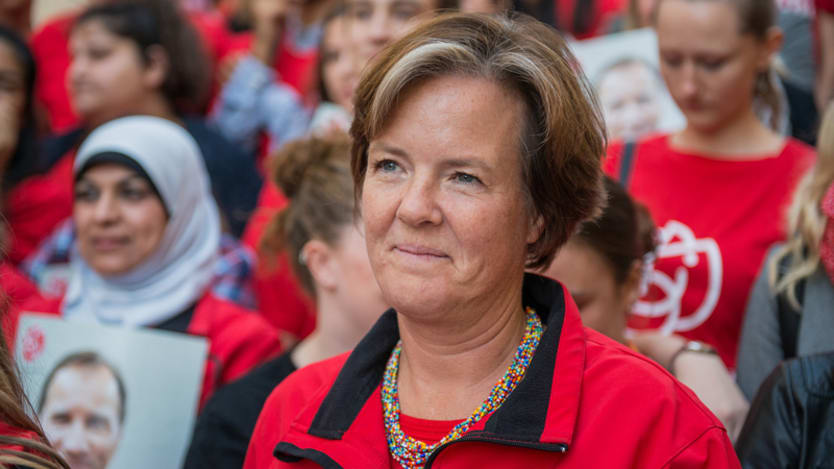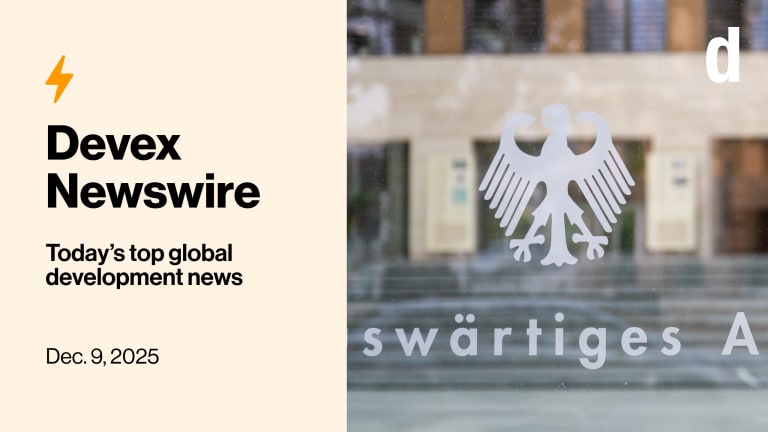
STOCKHOLM — A little over a year ago, Carin Jämtin took over as head of Sweden’s aid agency Sida, taking a leading role in a country that was recently named the most committed to development and has consistently dedicated nearly 1 percent of its income to aid.
“Sida is a fantastic place to work … In Sweden, fortunately, we have … broad consensus around the 1 percent target and what should be counted as aid,” she told Devex.
However, recent election gains for the far-right Sweden Democrat party — now the third largest party in the Swedish parliament — throw that consensus into doubt. Elsewhere in Europe, the influence of populist parties has seen aid reduced or redirected.
With coalition talks ongoing, it is too early to predict the spending of the incoming government, Jämtin said. The Sweden Democrats have said they want to cut aid spending but, shunned by other parties, they are unlikely to have a role in any coalition.
Jämtin, a former minister for international development cooperation with the center-left Social Democrats between 2003-2006, was a natural choice to take over the agency in May 2017, after her predecessor Charlotte Petri Gornitzka moved on to become chair of the Organisation for Economic Co-operation and Development’s Development Assistance Committee, the group that sets the international aid rules. The 54-year-old also brings NGO experience to the table, having been deputy secretary general of the Olof Palme International Center, a Swedish NGO working to promote democracy and human rights in low-income countries.
She now leads a team of 650 staff in Stockholm, controlling about half of the $6.2 billion Swedish aid budget; the rest is allocated by the Ministry for Foreign Affairs. Her biggest project has been developing a new five-year strategy for Sida which was signed off in September — the same month that elections threw Sweden into political disarray.
The new vision, which is not publicly available, does not represent a major departure from previous Sida strategies, she said, but highlights that “we need to strengthen ourselves in some areas.”
One of those is a shift toward poverty. “Sida is guided by poor people’s perspectives and rights … [but] we’ve been focusing on rights [and] spoken a little less than before on poor people’s perspectives,” Jämtin said, adding that “we have to rebalance that a little bit without losing the focus on the rights-based approach.”
This does not mean “working only on poverty in economic terms,” she cautioned, but will instead take a “multidimensional approach to poverty which means we will also look at who has least power in these countries.” Jämtin cited Sida’s work with women in Afghanistan and support for Roma populations in eastern Europe as examples.
The director-general also talked about the need for Sida to “sharpen our tools” for “long-term development cooperation” when working in fragile and conflict-affected countries, where the agency has been focusing more of its support in recent years.
“Development cooperation money will never be enough to reach the SDGs … so we are working on new ways of finding financing.”
— Carin Jämtin, director-general, SidaAnd there is the question of money: The new strategy will deepen the country’s work to find new ways of mobilizing funds for development.
“Development cooperation money will never be enough to reach the SDGs … so we are working on new ways of finding financing,” she said. That includes working with Swedish impact investors through the Swedish Investors for Sustainable Development network, which Sida facilitates.
Launched in 2016, the network includes the country’s 17 largest pension funds, asset managers, and investment companies, that work with Sida to help realize their role in the Sustainable Development Goals. The aim is to go beyond screening for unethical investments to making investments that have positive development and environmental impact.
Sida is also putting its own resources into innovative financing mechanisms such as challenge funds and guarantees, and wants to work with low-income countries to help boost their own revenues through tax reform, combating corruption, and land surveying.
Jämtin sees these combined domestic and international efforts as crucial to boosting financing for development, “because in countries without strong and well-functioning institutions, no foreign investors will come and domestic investors will invest elsewhere,” she said.
The Swedish parliament is set to vote on a new center-right prime minister on Nov. 14 in a bid to break political deadlock, but prospects for forming a government remain weak. A spokesperson for Sida told Devex: “What we can say is that there is broad support in parliament for Swedish aid and the 1 percent target … Different governments could, of course, have a different focus on what we should prioritize, which would reflect in the strategies.”








